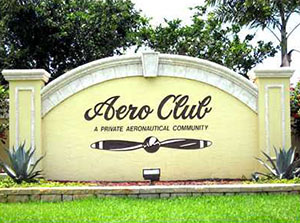A proposal to regulate civil aviation in Wellington had members of the village’s Equestrian Preserve Committee confused Wednesday as to why it is needed.
Committee members voted 6-0 to recommend denial of the Civil Aviation Ordinance, to the delight of about 50 residents of Wellington’s Aero Club who came out to fight the proposal.
“I think this ordinance sets a very bad precedent,” Committee Chair Cynthia Gardner said. “I think it is indeed a solution in search of a problem.”
The ordinance was originally introduced in 2012 after the Aero Club community — a neighborhood of about 250 homes with an airstrip in the center — voted to pave its grass runway. The committee tabled the ordinance, and it was largely forgotten until recently.
Last month, Wellington’s Public Safety Committee also recommended denial of the ordinance. It must go before the Planning, Zoning & Adjustment Board before being heard by the Wellington Village Council, which still could choose to approve it.
Wellington Project Manager Mike O’Dell told committee members Wednesday night that the ordinance would provide standards to protect the safety and welfare of those using the airparks in the village. Currently, only two properties in Wellington have airstrips: the Aero Club and the family-owned Loxahatchee Airport at the village’s western edge.
Because the Loxahatchee Airport is technically within the village’s Equestrian Preserve Area, the committee had to hear the ordinance.
The ordinance would limit commercial activities, set a weight limit, require that all park operations are subject to visual flight rules and prohibit “the prolonged running of aircraft engines” between 10 p.m. and 7 a.m., according to a Wellington staff report.
But opponents of the ordinance said that the Federal Aviation Administration already regulates all the provisions in the ordinance — some of which actually conflict with FAA rules.
John Herring, president of the Aero Club Property Owners Association, said the ordinance is redundant, considering FAA regulations and the community’s own bylaws, which restrict the types of airplanes allowed to use the airstrip, among other provisions.
“There isn’t anything in this ordinance that hasn’t been addressed, with exception to limiting our rights,” he said. “We’ve asked, ‘Why are we doing this?’ and can’t get a straight answer.”
He said he has discussed the matter with four of the five members of the council, who couldn’t give him a response. “They’ve all said they don’t know why we’re doing this,” Herring said. “Four of the five, so far, have told me they are against it. So, I don’t know why this keeps coming up. Staff says it’s because the council is pushing them, but the council says they don’t know what is going on.”
Further, Herring said his community has not received a single complaint about noise or other issues since the runway was paved. “The paving has made it quieter and safer,” he said.
Some of the regulations, such as the time constraints, he said are unenforceable.
“If I take off at a quarter to 10 at night, what are you going to do?” he asked. “The Public Safety Committee asked the [Palm Beach County Sheriff’s Office] if they would chase us down in a helicopter to enforce the ordinance. They won’t. Is this really how we want to spend our money?”
During public comment, not one of the roughly 30 residents who spoke or turned in comment cards supported the ordinance.
Committee Member Dr. Kristy Lund said Wellington hasn’t shown a need for the ordinance.
“There have been no complaints, and the community is already being policed by the FAA and its own regulations,” she said. “I don’t see a need for this.”
Committee Vice Chair Michael Whitlow agreed.
“I think this is absolutely unnecessary,” he said. “You do a fabulous job taking care of yourselves through the HOA and FAA rules and regulations. I see no reason to approve this. I just see it as a staff-driven thing that is of no value whatsoever.”
Committee Member Carlos Arellano said he did not want to see the ordinance come before the committee again.
“I’ve opposed this from the beginning,” he said. “If you like airplanes, you move to the Aero Club. If you don’t like them, you can move into the horse country. If you don’t like horse country, move to Miami.”








